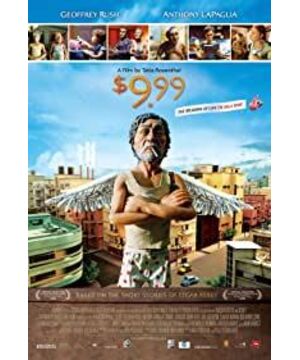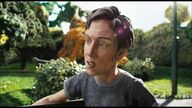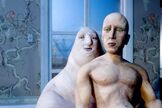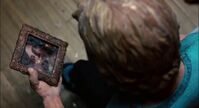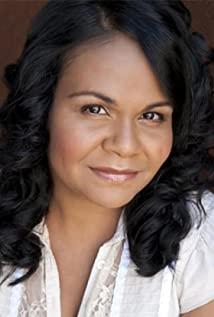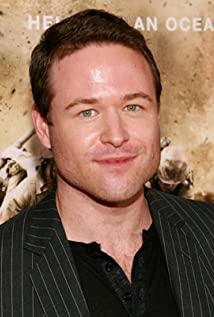The protagonist of the story (if we have to distinguish a protagonist) David Parker is an older young man who is unemployed and at home. He is kind and gentle, likes to talk to people, has patience and love, but his luck is not going well, so he even applied for a job by calling Small workers like salesmen fail because of "inexperience." David's father Jim often told him that he had to be aggressive and hard-working, and that the good man was always the one who was abandoned by life first. David is depressed, Jim is even more depressed. This middle-aged uncle whose wife ran away with others very early was bored with his career, and his two sons were not successful. When he went out to eat in the morning, he ran into a homeless man who committed suicide in front of him. Who else could have a happier, darker life than him?
However, maybe there is. The apartment building where Jim lives is full of weirdos. In addition to the Jim family, the film also focuses on four characters: Zach, a young boy who likes football very much, Rong, a young man who smokes marijuana, David's brother Lenny, and a lonely old man, Mr. Queller. In order to get his favorite football idol toy, Zach must drink a glass of milk every day according to his father's instructions, earn a few cents and save it in the piggy bank. In the day and night of anticipation and waiting, Zach's interest has quietly changed unknowingly... The childlike Rong is angry with his girlfriend because of his reluctance to get married, and he smokes marijuana in the interweaving of depression and excitement. , and the three imaginary fox and dog friends have a drunken break - the days of returning to the bachelor are really carefree! But what awaited him after this intense happiness was a deeper and darker loneliness. The seemingly unruly Lenny shaves his head and plucks his eyebrows for love, as long as his girlfriend likes him; but is there an upper limit to such sacrifice? What happened to Mr. Queler was even more bizarre. The lonely old man who lived in widowhood just made a wish to God when an angel came to visit him in a blink of an eye. But this angel's behavior is very strange, lazy, greedy, and cynical, and in the end, people can't figure out who helped whom and who deceived whom.
In addition to these main focus characters, the story is also interspersed with all kinds of strange people, the bankrupt magician, the supermodel who likes the hairless fat man, the little salesman on the other end of the telephone line, and so on. These mind-blowing people move through an apartment building, each bringing more details, bifurcations, and new questions to questions that no longer have an answer; one's situation hasn't improved yet another's troubles follow Then, the story became more and more complicated, and the film became more and more depressing. Just like David, who couldn't find a job no matter what, no one could think of a way out or a bright spot from it.
But it's not completely out of the way, and there is no bright color at all. Didn't David learn the meaning of life from the mail-order $9.99 guide to life booklet. Of course, these so-called six are just an extension of the movie's dark humor. What is the real meaning of life? Is it a willing sacrifice for some emotion? For example, Zach, who set the piggy free for love, or Lenny, who was willing to have plastic surgery for love? Is it Mr. Queler, who finally moved forward in order to retain his memories? Or the moment of dolphin play that David and Jim finally got? Or, is it the synthesis, the whole, of all this?
But if all the clues of the characters are gathered together along the line of "the meaning of life is not unique", and the confusion they have to experience, the pain they have to endure, and the happiness they finally get because of the pain are all integrated together, then Wouldn't it become a chaotic and chaotic life itself? And the meaning of life we explore, desperately analyzing, summarizing, and summarizing, is not just to remove the noise, to identify a clear direction in the originally vague feelings, to maintain a stable emotion, and to create a measurable and controllable. Could it be a better life experience? We are supposed to achieve this goal of clarity, but how can we walk in circles and return to the original life itself, which is disordered and meaningless? Stuck that in order to achieve meaning, we must first give up meaning?
I really wish there was a $9.99 booklet explaining all this. But wait, isn't this the movie called "Australian $9.99" itself? What Israeli writer Etgar Keret and director Tatia Rosenthal of the original short stories offer through the film is not just a random collection of perspectives, it does try to discern some sort of order, graspable, controllable element from disorder. It is like a collection of short stories. There is still a focal point, a cohesive force in the scattered refraction surface; but this focus and center is not to provide some kind of affirmative correct answer to the "meaning of life", on the contrary, it It is to expose the problem by describing the details, showing step by step the helplessness and incompetence of people in the face of various confusions. What I find really interesting is the unexpected explosion of human potential we observe during this awkward and painful display. Whether it's David, Jim, Laney, or Mr. Queller, or even the little kid Zach, they all make some unexpected choices about their lives that deviate from the established track. These accidents have brought a wave of climax to their lives. Although they are short-lived and even weak, they have all gained something different through such experiences. These different things may be just a momentary touch for some people, and some kind of crucial turning point for others. While the meaning of life does not lie in the moments or turns themselves, the will, ability and action to change is what ultimately drives each of us on our journey. Milan Kundera, in The Unbearable Lightness of Life, directly compares human nature with animal nature, arguing that people are doomed to tragedy because they are unwilling to settle for simple and repetitive cycles and can never achieve true happiness; The tragic pursuit of people's rejection of simple repetition is also unique to human nature on another level - people can choose to change their desires, change their habits, change their hobbies, and even change their appearance to seek some kind of illusory spiritual satisfaction. . The result of change is of course disordered, chaotic, and completely uncontrollable, but at the moment when the decision to change is made, the definition of a person has already been realized. Is this the meaning of life? I don't know, but one thing should be true: what can be summed up is always far from the real meaning. The meaning of life is not in the pages of the book, and the meaning of life is not in the movies. The meaning of life is only in life, a thousand people have a thousand meanings, never repeat.
So, what does this "A$9.99" finally say? ——Well, it still seems impossible to summarize.
So, when you can't summarize the answer, take a sigh of relief and learn how to swim like a dolphin, I think it's actually pretty good.
View more about $9.99 reviews


